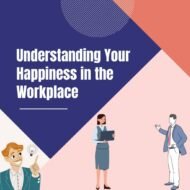Posted by Managementguru in Human Resource, Productivity
on Oct 1st, 2022 | 0 comments

When you think of your career prospects and your personal life, you might not be someone who tends to think of your happiness as being something that makes a success story. However, your working life might comprise a high percentage of what you do in any given week and putting your emotional state to one side for that long could have negative consequences on your mental health. There are many ways in which your happiness might be affected in the workplace, and that means that there are potentially many ways for you to go about improving how you feel, if you think that there is room to do so. Happiness in workplace Mistreatment and Resolution Not everyone is fortunate enough to work in an environment where they are valued as individuals by their employer. To those who do work within an unpleasant or negative space, it can feel as though you’re trapped, with little that you can do about it. There are always HR and similar routes if you feel as though something needs to be done about it, but it might also be that the problem that has arisen is to do with a particular issue or dispute, such as something to do with overtime pay, for example. In these cases, it helps to be sure. Therefore, taking the steps to calculate regular rate of pay can help you to understand your position and if you’re being taken advantage of, potentially leading to the next step of getting legal help involved. The Space Itself You might not even think about how much the physical space that you work in impacts your happiness, but if you’re finding yourself to be miserable most days at work, it could certainly be worth investigating. If you don’t find yourself in a position to do much, it can lead to some despair, but it also might be something that opens a conversation with your co-workers and employer. Therefore, the first step might be to simply recognize the kind of impact that workplace design can have on the mood and productivity of the employees working there. When tied to productivity like this, the move to have the environment changed for the better could appeal to the reasoning of the higher-ups. Your Personal Time If you’re someone who doesn’t particularly enjoy your time spent working, it might cause you some dissatisfaction that it takes up so much of your personal time. If this is the case, it might be time to consider some flexible working options that could potentially change that. If this is a conversation that your current employer is willing to have, it might help you to adjust more comfortably within your current job. However, there’s a chance that they might not be willing to do so, meaning that you would likely be encouraged to look for work elsewhere in order to find a situation that suits you better. This might not be such a bad thing, though, and understanding what makes you happy in a day-to-day way can help you to customize your career to your own...

Posted by Managementguru in Glossary, Human Resource
on Dec 3rd, 2014 | 0 comments

This HR Glossary pertains to ‘A’ series terminologies Ability Aptitude or competence, the skill or proficiency needed to perform certain tasks. Ability test An assessment instrument used to measure an individual’s abilities, mental or physical skills level (i.e. problem solving, manual dexterity, etc.). Absenteeism Referred to as the habitual failure of employees to report for work when they are scheduled to work. Absolute ratings A rating method where the rater assigns a specific value on a fixed scale to the behavior or performance of an individual instead of assigning ratings based on comparisons between other individuals. Abstract reasoning The process of perceiving issues and reaching conclusions through the use of symbols or generalizations rather than concrete factual information. Acceptance theory of Authority A manager’s authority rests on his or her subordinate’s acceptance of his or her right to give orders and to expect subordinate’s compliance with them. Accessibility The extent to which a contractor’s or employer’s facility is readily approachable and does not inhibit the mobility of individuals with disabilities, particularly such areas as the personnel office, worksite and public areas. Accessible format Materials that are designed in alternate formats such as Braille, audiotape, oral presentation or electronically for individuals with visual impairments. Accident and Health Benefits Employee fringe benefits paid usually through employer funded insurance plans. Accountability The responsibility placed on an individual or group for their own or others’ actions, conduct, performance, projects, etc. Accreditation A process of external quality review and certification by a recognized body that evaluates individuals, colleges, universities and educational programs to assure they are performing the functions that they claim to be performing in a competent manner. Achievement test A standardized testing instrument used to measure how much an individual has learned or what skills he or she has attained as a result of education, training or past experience. Acquisition The process of acquiring control of another corporation by purchase or stock exchange. Action learning A learner-driven, continuous learning process where learning revolves around the need to find solutions to real problems. Active learning The process of learning new knowledge, skills and behaviors through taking specific actions or performing specific tasks. Active listening A manner of listening that focuses exclusively on what the other person is saying and validates understanding of both the content of the message and the emotions underlying the message to ensure exact understanding. Activities of daily living (ADL) The personal care activities which are essential to an individual’s everyday living, including eating, bathing, grooming, dressing, mobility and toileting. Action-centered Leadership A theory of leadership which focuses on what leaders actually have to do in order to be effective,rather than on the personal qualities that they need to be good leaders, and which believes that leadership can be taught. Adjunct program A supplemental training tool that applies programming principles to existing instructional modules, materials, texts, manuals, etc., that are designed to direct the learner to specific areas within the module. Adjudicator: Aa person who gives a decision on a problem, an adjudicator in an industrial dispute. Administrative service organization (ASO) A term used to define an organization that provides outsourced solutions to meet the administrative and HR needs of the client with the client retaining all employment-related risks and liabilities. Administartive Officer Office employee responsible for managing the office, running errands and assisting the executive or boss, typing, filing, and other office related duties as required by the specific job. Adverse action Any act by an employer that results in an individual or group of individuals being deprived of equal employment opportunities. Adverse impact A substantially different rate of selection in hiring, promotion or other employment decision that works...




